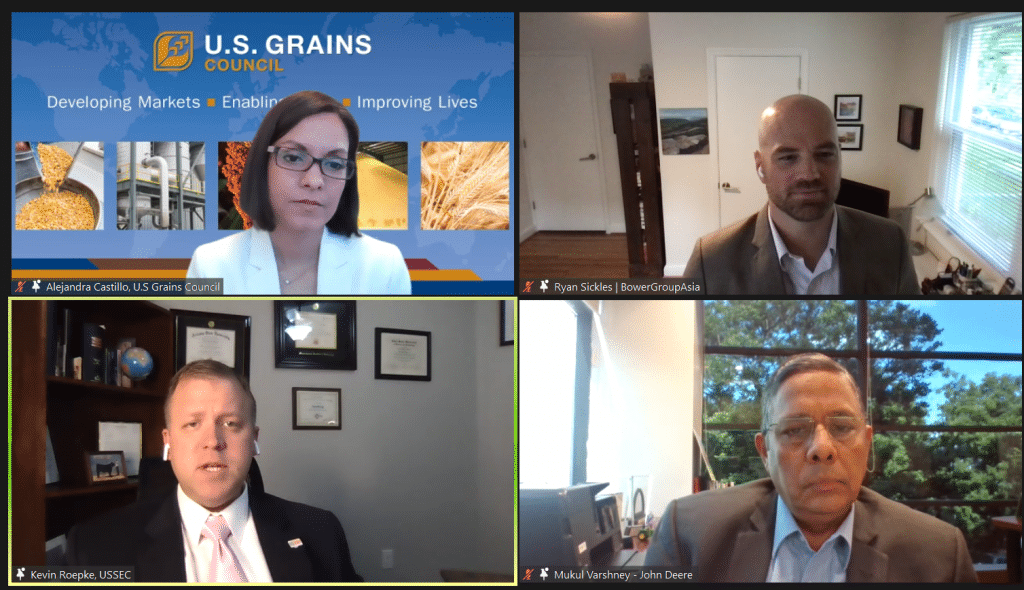Grains Week London, held June 7-11, brings the industry together for strategic debate and discussions through a week-long program centered around the vital role of international grain trade. Members of the U.S. Grains Council’s (USGC’s) staff participated as speakers, sponsors and participants in these events to elevate the Council’s work and drive the message of emerging markets to more than 300 attendees.
“We often think that having free trade agreements with different countries will remove most protectionist policies, and sometimes that is the case. But even with some of our closest trading partners, there are still issues that arise that limit trade,” said USGC President and CEO Ryan LeGrand during his recorded presentation about strategic risks in the market.
“Navigating the pitfalls of trade policy with the goal of free trade ultimately will allow all markets to win in the grain trade arena. The U.S. Grains Council’s strategy of relationship building can be a solution to some of the trade-limiting efforts around the world.”
The event – hosted by the International Grains Council (IGC), Grain and Feed Trade Association (GAFTA) and the International Grain Trade Coalition (IGTC) – traditionally involves trade associations and grain trade within the European Union and has expanded to include participants from the United States over the last few years. This year, the event covered emerging markets, especially those in Latin America and South and Southeast Asia. The new focus provided the Council the opportunity to feature several offices and spotlight niche markets and collaborations with the U.S. Department of Agriculture’s Foreign Agricultural Service (USDA’s FAS).

Bangladesh was the focus of several activities during the conference, which opened conversations about the opportunities and continued challenges in that market.
A presentation by Tyler Babcock, FAS agricultural attaché in Dhaka, provided an update on the grain and feed market in the country, highlighting local growth and projections through the stories of Bangladeshi importers and industry.
USGC partnered with the U.S.-Bangladesh Business Council to host a panel on trade facilitation tools available in South Asia, particularly in Bangladesh and India. Along with colleagues from the U.S. Soybean Export Council (USSEC) and John Deere, the panel discussed GSM-102, a program that provides export credit guarantees, and the USDA Facility Guarantee Program, a program that provides credit guarantees for infrastructure investments. The speakers shared that Bangladesh’s participation in these programs could be a game changer for accessing credit for trade flows into the country and it signals the U.S. government is serious about engagement in South Asia.
The USGC South Asia office has been working to change perceptions of Bangladesh. As a credible and reliable market for U.S. commodities, the country has been growing relationships between suppliers and end users. The Council sees growth opportunities in the poultry and aquaculture markets in Bangladesh, coupled with interest from importers to have direct-buying relationships with U.S. suppliers.
Additional USGC presenters during Grains Week London included:
Marri Tejada, USGC regional director for Latin America, who discussed selected markets in Central American and the Dominican Republic, diving into animal production projections and examining pre- and post-COVID animal production outputs and recovery periods for each sector.
Alejandra Danielson Castillo, USGC regional Director for South Asia, who reviewed avenues for enhancing trade facilitation in South Asia.
Ronnie Tan, USGC Southeast Asia regional aquaculture consultant, who presented on the outlook for the global livestock and poultry sectors.
View FAS Dhaka’s video about the grains market in Bangladesh, shared at the IGC event.
About The U.S. Grains Council
The U.S. Grains Council develops export markets for U.S. barley, corn, sorghum and related products including distiller’s dried grains with solubles (DDGS) and ethanol. With full-time presence in 28 locations, the Council operates programs in more than 50 countries and the European Union. The Council believes exports are vital to global economic development and to U.S. agriculture’s profitability. Detailed information about the Council and its programs is online at www.grains.org.

